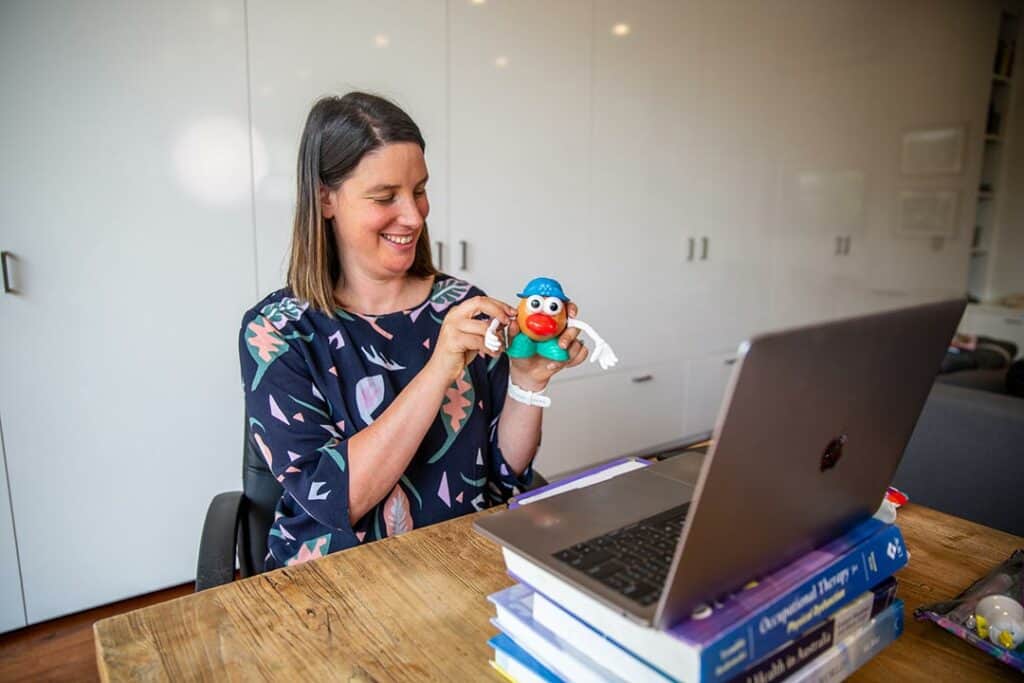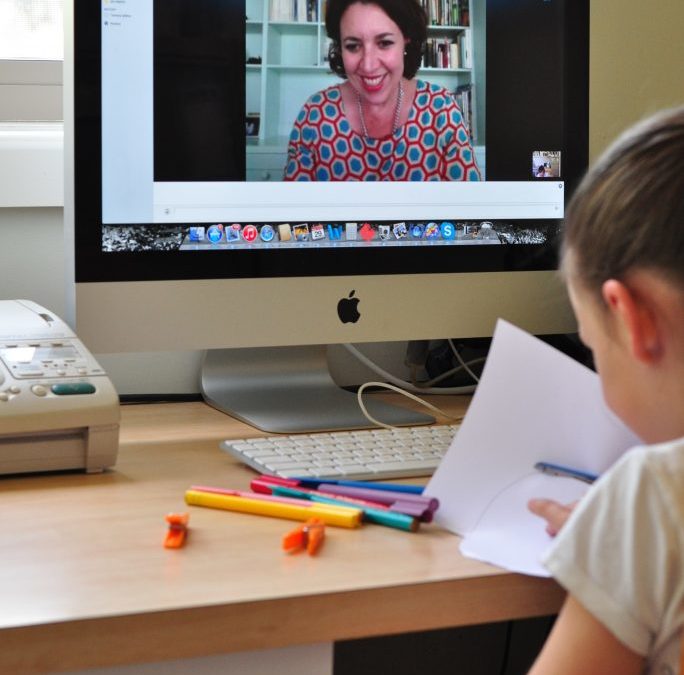Are you deciding between a speech therapist or a vocal therapist? This concise guide outlines the distinct roles each plays in treating communication ailments. Whether you or your child is struggling with speech challenges, you will discover which therapy aligns with your conditions and how to pursue the right treatment.
Key Takeaways
- Speech therapy, conducted by speech pathologists, addresses a range of communication challenges, including articulation, language, stuttering, voice disorders, cognitive-communication, and swallowing disorders.
- Voice therapy, aimed at individuals with voice box or vocal fold issues, implements exercises and behavioural modifications focusing on vocal health, particularly for professional voice users at risk of vocal strain from intensive voice use.
- Therapy Connect offers personalised online speech therapy services tailored to client needs and goals. We have experienced Speech Therapists, otherwise known as Speech Pathologists, delivering research-supported methods.
Speech Therapy
Speech therapy is a comprehensive field that tackles a variety of communication challenges, such as:
- Articulation issues
- Language delays
- Stuttering
- Voice disorders
This therapy is conducted by speech pathologists trained to diagnose and treat speech, language, and swallowing disorders.

What is the Scope of Speech Pathology?
Speech pathologists are highly trained professionals who treat various communication issues. Their scope includes language disorders in both children and adults, speech disorders affecting sound production, and speech fluency issues such as stuttering.
Speech pathologists work with individuals with developmental delays, articulation challenges and language processing issues. Through careful assessments, they formulate personalised therapy plans targeting each individual’s unique needs, ultimately improving their everyday communication skills.
Helping with Speech Challenges
Speech therapy is key in improving pronunciation, enhancing speech muscles, and instructing correct speech production methodologies. Common speech disorders treated by speech therapists include:
- Stuttering
- Apraxia of speech
- Dysarthria
- Lisping disorders
- Cluttering
- Selective mutism
For instance, children who experience speech delays, known as alalia, are assessed and treated to address and correct underlying causes, helping them achieve expected verbal communication milestones for their age.
Beyond Speech: Swallowing and Cognitive-Communication Disorders
Speech therapists treat speech disorders, swallowing disorders, and cognitive-communication disorders. Swallowing difficulties, often associated with neurological conditions such as stroke or brain injuries, are another critical area of focus. Speech therapists work to enhance patients’ ability to swallow safely and effectively, thereby improving their overall quality of life.
Cognitive communication disorders, such as aphasia resulting from damage to the brain, are also within the scope of speech therapy. Speech therapists provide strategies and interventions to help individuals improve their cognitive communication skills, enabling them to understand better and express language. By addressing these complex issues, speech therapists play a crucial role in helping patients regain their communication abilities and lead more fulfilling lives.
What is Voice Therapy?
Voice therapy targets issues concerning the voice box and vocal folds. It emphasises therapeutic vocal and lifestyle behaviour modifications to mitigate hoarseness and other vocal problems. It is often the first line of treatment for vocal fold lesions such as vocal fold nodules, polyps, or cysts, which can significantly impact vocal quality.
This therapy is particularly beneficial for professional voice users who experience vocal strain due to the demands of their professions.
Types of Voice Disorders
Voice disorders can be broadly categorised into three types:
- Functional voice disorders: These result from improper use of the vocal mechanism.
- Organic voice disorders: These are due to structural abnormalities.
- Psychogenic voice disorders: These stem from psychological factors.
Common symptoms of voice disorders include changes in voice quality, pitch, and loudness. These can lead to a strained, husky, or weak voice or, in severe cases, a total loss of voice.
Voice therapy provides specialised care for conditions such as laryngitis, muscle tension dysphonia, vocal cord dysfunction, and lesions like nodules, polyps, and cysts. These issues can significantly affect vocal quality, causing a raspy or hoarse voice.
Professional voice users, such as singers and actors, often face these challenges due to intense vocal demands, making voice therapy a critical component of their vocal health regimen. This therapy aims to restore optimal voice production and prevent further damage.

Therapy Connect: Connecting You With Speech Therapists For Tailored Care
Does your child or you struggle with speech clarity, social interaction, or swallowing difficulties? Therapy Connect can empower you to communicate and thrive. We connect you with expert speech therapists who are experienced with working with children and adults. Our tailored programs address a wide range of speech and communication needs, including:
- Articulation and phonology: Improve pronunciation and clarity of speech.
- Language development: Enhance vocabulary, comprehension, and social communication skills.
- Fluency: Address stuttering and disfluencies in speech.
- Voice concerns: Develop vocal health and manage vocal limitations.
- Swallowing difficulties: Improve safe and efficient swallowing.
We are a registered NDIS provider, making our services accessible to all. Therapy Connect delivers all speech therapy sessions online, eliminating travel time and costs. Our convenient solution allows you to connect with top-tier speech therapists across Australia from the comfort of your home.
Contact us today to schedule your consultation, discuss your goals, and develop a personalised plan that empowers you or your child to reach your full potential.
When to Consult a Speech Therapist
Knowing when to seek a speech or voice therapist depends on your challenges. Speech therapists are best for addressing speech-related problems such as articulation issues, language delays, or swallowing difficulties.
Identify Your Needs
Recognising your specific needs lets you decide whether to seek a speech or voice therapist. Speech issues typically involve problems with the muscles and structures used for speaking, such as stuttering, difficulties with pronunciation, or speech that sounds nasal due to issues with the lips, teeth, tongue, palate, or throat.
Comprehending these differences aids in making an informed decision about the necessary type of therapy.
Frequently Asked Questions
What is the difference between speech therapy and voice therapy?
Speech therapy covers a wide range of communication challenges, including speech, language, and swallowing disorders, while voice therapy specifically focuses on improving vocal issues and voice quality. Both aim to enhance communication skills.
When should I see a speech therapist instead of a voice therapist?
You should see a speech therapist for speech articulation, language delays, or swallowing difficulties. A voice therapist is more suitable for voice-related concerns such as vocal nodules, hoarseness, or other voice box-related issues.
What makes Therapy Connect’s therapy programs unique?
Therapy programs at Therapy Connect are unique because they offer tailored, evidence-based therapy designed for online delivery. They match clients with therapists based on their specific needs and provide personalised and effective care.
Final Thoughts
Both speech therapy and voice therapy are crucial for addressing communication challenges. Speech therapy covers many issues, from articulation and language delays to swallowing and cognitive-communication disorders. On the other hand, voice therapy focuses on treating voice disorders and improving vocal quality, especially for professional voice users. Understanding the differences and similarities between these therapies is essential for choosing the right path to effective communication.
Therapy Connect is a leading provider of online therapy services, offering personalised and evidence-based programs through a team of skilled therapists. By using innovative telepractice solutions, we ensure that high-quality care is accessible to individuals all over Australia, including in rural and remote areas. Contact us today to schedule your consultation.



